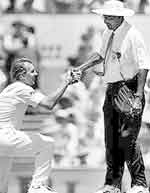| New umpiring law recommended by the ICC * They owe him an explanation In what might result to be yet another affront against the cricket playing nations of the ‘third world’, Lankan Attorney-at-Law Senaka Weerarathne claims that he has been denied credit of being the first to propound the International Cricket Council’s (ICC) latest rule on the third umpire. 
The proposed rule recommended by the Cricket Committee of the ICC last week during their two-day meeting in Dubai states, that players be permitted a limited number of appeals to the third umpire if they feel a decision made by the on-field umpire is incorrect. Elaborating further on how the new appeal system might work, the General Manager – Cricket of the ICC, David Richardson said, that “each team will be allowed three appeals to the third umpire per innings. If the appeal is successful they will retain the right to three appeals but, if not, then it is lost.” Only the Captain from the fielding side and the batsman in question will be entitled to make the appeal by approaching the on-field umpire making the sign of a TV with his hands, he added. The Committee has further recommended that the proposed rule be tried out during the ICC Champions Trophy to be held in India this October and then be subject to scrutiny/review upon the conclusion of the Tournament. “My writings regarding the necessity of introducing such an appeal mechanism into the game of cricket, was first published in ‘The Australian’ on March 25, 1997, whilst I was residing in Darwin,” said Senaka Weeraratna. “In this article, besides suggesting an almost identical mechanism, I also drew from my experience as a lawyer and made an analogy between the proposed rule and the judicial system,” he said. For example, he had explained how “a dissatisfied litigant has the right to appeal against the decision of the judge to a higher court or a full bench.” Furthermore, he had elaborated on how a similar principle of appeal should be adopted in cricket rules, where a discontented captain should be allowed to appeal against the ground umpire’s decision to the third umpire. Thereafter, Weeraratna had periodically sent similar writings to Newspapers around the world, and got his articles published in esteemed British publications such as ‘The London Times’ and ‘The Cricketer’ and popular Australian publications such as ‘The Sunday Age’ and ‘Northern Territory News’. Subsequently he also wrote to Newspapers and Sports Magazines in Sri Lanka, Pakistan, Malaysia, South Africa, India, the West Indies, Zimbabwe, Bangladesh and New Zealand, from 1997 right up until 2003. “Therefore, when England’s cricket coach Duncan Fletcher who had mentioned a similar concept in his book “Ashes Regained – The Coach’s Story” last year, and was thus claiming credit for having propounded the ICC’s recommendation, all hell broke lose! Weeraratna was stupefied as to how Coach Duncan could claim credit for something he had brought to light more than nine years ago. “It almost amounts to plagiarism,” he said emphatically. There’s no way the ICC can deny having any knowledge of Weeraratna’s writing he said, as, for one thing, his writing has been so widely circulated and two, because a copy of his writing had been hand delivered to former President of the Asian Cricket Council Upali Dharmadasa, to be tabled at the ICC Conference in 1997, just before he left the island to attend it. “It all boils down to the reality that, outside of the playing field, there’s little or no recognition given to cricket writers/thinkers belonging to the third world countries. Neither is there any support or encouragement shown to these writers to provide their input/contribution to the making of rules. This issue also highlights the little emphasis and low priority local sports authorities have with regard to safeguarding the intellectual rights of sports writers and encouraging others like them to get involved in the intricacies of the game,” he said. A perplexed Weeraratna exclaims dishearteningly “What makes Duckworth and Lewis any different from me?”
|
||||
Copyright © 2006 Wijeya Newspapers
Ltd. All rights reserved. |
 His
article went on state that the third umpire’s role should
be extended to perform an appellate role in respect to doubtful
catches, run outs and stumpings (which have not obviously been referred
to the third umpire by the ground umpire). He had even mentioned
that the appeals should be restricted to about five per side, per
innings, so as not to unduly protract or destabilise the game.
His
article went on state that the third umpire’s role should
be extended to perform an appellate role in respect to doubtful
catches, run outs and stumpings (which have not obviously been referred
to the third umpire by the ground umpire). He had even mentioned
that the appeals should be restricted to about five per side, per
innings, so as not to unduly protract or destabilise the game.